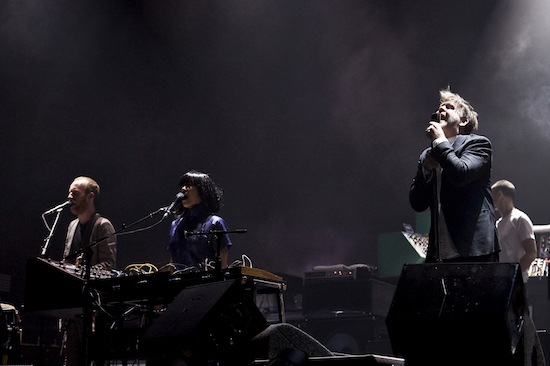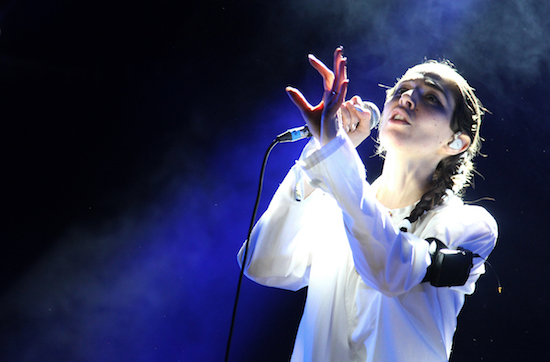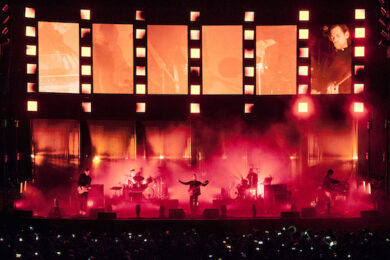A Moon Shaped Pool isn’t a festival album
…which isn’t to say that Radiohead didn’t put on a good show, rather that the intimacy of their new album dissipates a little when pumped out over a towering stage teetering under the weight of its own Heineken branding. On record, ‘Burn The Witch’ rides on stark, minimalist strings, but live these are understandably absent, and matched to an underpowered PA system, the show feels like like it slinks into life, spark-free; any Catalan heretics fearing cremation could be thankful that the pyre didn’t look to be lighting. This feeling of slight paltriness affects the opening run of A Moon Shaped Pool‘s first five tracks in sequence, the band sounding too spindly to coax the melancholic haze that suffuses the record. It takes the warped sounds of Spanish radio announcing ‘The National Anthem”s arrival to properly inaugurate proceedings, while the gossamer notes of ‘No Surprises’ remove the distance between the crowd and the stage, the band seeming more comfortable, wending between old and new material. ‘Karma Police’ ushers in a moment for the crowd to take the lead, reprising the song’s reprise after it ends, lyrics of pre-millennial isolation de-isolating the gathered thousands. From there, the set is a pure fan’s delight: the stuttering beat and gorgeous metallic chords of ‘Idioteque’ wind towards a speckled closing wig-out; ‘Paranoid Android’s multi-part grandeur loses none of its potency and comparatively later material, ‘Nude’ and ‘There, There’, is received with as much joy as the OK Computer and Kid A big-hitters. They wrap up proceedings with ‘Creep’, which in fact means…
‘Creep’ is becoming less of a rare commodity
…but it’d be a hard heart to question what (the hell) the track was doing there.
Primavera will make a mockery of you
If you’re going to freewheel around looking for your friend to return that snapping-crocodile hand gesture you’re making, man with mobile phone, prepare to feel the collective wrath of a crowd whose senses will not be dulled by any amount of supermarket sangria. With great haste will you find yourself in a sea of people making self-same gesture, and with similar speed will your hopes of a rendezvous vanish.
It’s a fine show from the old guard
No accusations of paltriness could be levelled at LCD Soundsystem’s set the night before Radiohead. James Murphy and co sound muscular, urgent, pleasingly agitated. Under a sky strewn with searchlights, they switch effortlessly from the whipcrack electric shock of ‘Movement’ to ‘Someone Great’, which here feels like an idealised festival anthem, emotive without being sentimental, the lyrics as broadly applicable as they are specific. The entire production feels wonderfully bare: few effects linger on the shots of the band performing on the screens, giving a clear view of a group who seem to have lost nothing for their break.
Elsewhere, Brian Wilson playing Pet Sounds, and then every other Beach Boys hit, is an unadulterated joy and the songs of PJ Harvey’s The Hope Six Demolition Project take on a ritual intensity rendered live, her saxophone sounding more like a blaring carnyx. And good though these are, it’s the stages further afield, that are the staging grounds for the festival’s most abiding moments:

Q: Where’s all the pop music gone? A: Under a giant solar panel
Whatever powers the Photovoltaic Cell, that massive slanting structure that lingers in the background of everyone’s photos from the festival, has – beyond some sweet photon-based conversion, obviously – they seem to be transmitting down to the stages nestling below. Empress Of’s Me was one of last year’s best pop albums, and here it’s given due prominence. The recorded versions feel deliberately sparse, yet here they’re even more so, Lorely Rodriguez’s voice leaping through the octaves above slow-shifting planes of synth on ‘Everything Is You’. Similarly, the layers of electronics on record retracted with the sparser set-up, Chairlift’s ‘Moth To The Flame’ feels more direct here, freeing up Caroline Polachek’s vaulting vocal. Their Saturday night set puts forward a good case, too, for ‘Crying In Public’ being one of their finest crafted songs, smuggling in lyrics that index a moment of overwhelming realisation to sit lightly on the evening breeze.
It’s not just pop that benefits from its stay in Parc del Fòrum – the deft folk rock of Steve Gunn finds a home from home on the Balearic coast. Eyes On The Lines, Gunn’s new album released on the day he plays Primavera, attests to his ace interplay with James Elkington, and here, the latter’s occasional turns on steel guitar are a particularly welcome texture, gentle waves that lap against the sounds bleeding from the distance. Closer ‘Park Bench Smile’ is maybe the highlight: an interweave of fingerpicked guitar maps onto a loping, bassy rhythm before subsiding back again, meshing gorgeously.

Evian Christ’s more of a hoot than The Avalanches
The capacity to induce mirth is probably not the most productive metric by which to measure electronic music, but when you’ve got two sets taking place side by side simultaneously, you take what you can get. Don’t get me wrong, the Avalanches’ was a brightly-coloured blast that duly ignited a wave of elation from the crowd at ‘Frontier Psychiatrist”s brief mid-set airing. But all their cheek is more or less topped by Evian Christ, who begins his spot on the Pitchfork stage with "Conde trance" written on the screen behind him, presumably a nod to the website’s parent company. The sound of media conglomerate electronics? t.A.T.u.’s ‘Not Gonna Get Us’, if produced by Ferry Corsten.
Kamasi Washington provides festival-claiming show, part 1 of 2
Two spots that could make a strong claim for the festival’s outright best begin with Kamasi Washington’s in the packed-to-capacity Forum Building. In his Baker’s Dozen for the Quietus, Washington talked about trying to replicate Busta Rhymes’s phrasing on his saxophone, and this sense of hybridised sonics permeates his set. Bathed in discs of primary-coloured light, the band deal out a frenetic and spacious freak-out, and the overriding feel here is one of inclusivity, where each member of the band – Miles Mosley working through a bass solo that initially gets drowned out by the crowd; Professor Boogie unfurling a wah’ed riff on the keyboards; Washington’s father Rickey on the funky, staccato stride of ‘Giant Feelings’ – gets a moment of their own and the audience play a role in this stylistically fluid show. Maybe it’s respite from the sun that seems to edge the audience up into a frenzy (Richard H. Kirk’s Cabaret Voltaire set the day after incites a rave that instantly takes out the first rows of seats in the pitch darkness), but Washington and his band instil a sense of generalised joy that the crowd carry back out, through a battery of low-flying bats seemingly woken and sharing a taste for free jazz, and on to the main site.
Vince Staples provides festival-claiming show, part 2 of 2
The main site, where Vince Staples’s set is already taking shape. The Long Beach rapper’s show has at least as much energy as Washington’s, but delivered by one man rather than seven musicians. It courses through him such that it almost impairs movement, Staples staggering as he moves across the stage. His conviction alone is enough to make the crowd an instant win-over – even if, introducing his Flume collaboration ‘Smoke & Retribution’, he promotes steering clear of alcohol and drugs, he gets a cheers from a crowd who have presumably misunderstood his sentiment – but the visuals, looping clips of Vanilla Sky and Eloise In Paris, add an unerring counterpoint that more than makes up what Staples lacks in numbers. The best aspect, though, is the subtle transformation his tracks undergo: the latent claustrophobia on Summertime ’06 is opened up to something more virulent, and ‘Norf Norf’, a survey of his Los Angeles neighbourhood, feels both darker and more anthemic.



